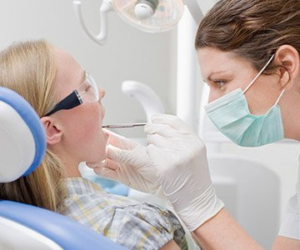If you experience severe pain in your mouth or jaw or have a lost tooth, visit a 24-hour emergency dentist immediately. The longer a dental issue goes untreated the more damage it may cause.
Toothache, fever, pus, swollen glands, bad taste in your mouth are all signs of a dental abscess. An emergency dentist will drain and treat the abscess quickly. Contact Emergency Dentist Las Vegas now!

An abscessed tooth is a painful condition caused by bacterial infection. Bacteria enter a broken, chipped or decaying tooth and cause a buildup of pus in the center of the tooth. The pressure from the buildup of pus causes severe pain and can lead to swelling of the face, neck or jawbone. In some cases, the bacteria can even spread to the surrounding gum tissue and bone. If left untreated, an abscessed tooth can be very dangerous and could even be life-threatening.
The most common sign of an abscessed tooth is a pain in the mouth, usually in the center of the mouth. This pain may be aggravated by eating or drinking hot or cold foods or by chewing. The patient may also experience a bad taste in their mouth, swelling of the jaw or neck and a fever. The bacterial infection that causes an abscessed tooth typically forms in the pulp, which is the area of a tooth containing blood vessels and nerves. This infection can be caused by bacteria present in plaque, a traumatic injury to a tooth or a dental procedure like root canal treatment.
If an abscessed tooth is not treated, the bacteria can spread to other parts of the body, including the heart and brain. This is known as a sepsis, which is a life-threatening infection.
Tooth abscesses are often caused by poor oral hygiene or a lack of routine visits to the dentist. People who smoke are more likely to develop a tooth abscess, as are those with a dry mouth (xerostomia). Certain diseases and medications can also lower your immune system, making it harder to fight off germs.
The dentist will drain the abscess to get rid of the bacteria and stop the infection from spreading. They will make a cut in the abscess to release the pus and then rinse the area with saline solution. A root canal treatment will be done if the abscessed tooth is salvageable to clean out the infected tissue and repair the damage. Antibiotics will be prescribed if the infection has spread beyond the abscessed tooth or if the patient is immunocompromised.
Knocked Out Tooth
A knocked out tooth (also called an avulsed tooth) is one of the most serious dental injuries and is considered a dental emergency. It is possible to save the tooth if it is treated promptly. It is important to not leave the tooth untreated because the roots and supporting tissue will die. This will lead to permanent damage and the remaining teeth may move into the space of the missing tooth, causing cosmetic problems.
Knocked out teeth are common, and the good news is that this type of dental injury can often be fixed by your dentist. The first step is to carefully find the tooth. Do not touch the root of the tooth, but only the crown (white chewing surface). Try to put it back into place if it fits. If you can’t reinsert it, put the tooth in a small amount of milk or your own saliva to keep it moist. It is also a good idea to keep the tooth between your gums and cheek or in a dental preservation product such as those sold at your local drug store.
If you can’t reinsert the tooth, make sure to bring it with you to your dentist appointment. Ideally, you should get to the dentist within 30 minutes of when the tooth was knocked out for the best chance of saving it.
If the accident that caused the knocked out tooth occurs outside of your dentist’s office hours, call them for advice and a referral to an emergency dental clinic. The dentist should have an emergency contact number on their website and/or in their telephone book. An emergency dentist will be able to give you immediate care and may even be able to re-implant your tooth! Knocked out teeth aren’t as dramatic as a movie hero brushing off a rough blow, but they can be just as scary and painful for kids and adults. Fortunately, a knocked out tooth doesn’t always mean the loss of a permanent tooth. Knocked out teeth can often be saved if you take the proper steps immediately.
Broken Tooth
Even though tooth enamel is the hardest, most mineralized tissue in your body, it doesn’t insulate your teeth from damage. Whether you bite down on an ice cube and feel a crack in your tooth, get hit with a blow to the face, or simply break a molar while chewing, a broken tooth can be painful and scary. Whether the break is slight or severe, it’s important to see an emergency dentist right away.
Broken tooth symptoms may include pain when you chew, sensitivity to hot or cold foods, and swelling of the gums around the broken tooth. If a cracked tooth goes untreated, bacteria can get into the crack and cause infection of the pulp inside your tooth. Infection in the pulp can lead to other serious dental problems, such as a root canal or tooth loss.
Generally, your dentist will repair a cracked tooth with a crown or filling. However, if the crack is very deep or goes all the way to the root of your tooth, you’ll probably need a root canal and a crown.
If your broken tooth is sensitive, rinse your mouth with warm water and use a soft toothbrush to clean the area. You can also take over-the-counter pain relievers like acetaminophen or ibuprofen. Applying a cold compress can help reduce swelling and ease your pain.
Tooth fractures are more common in the back teeth, especially the molars because they handle the brunt of chewing. However, any tooth can break. Cracks in teeth can be mild to severe, and can occur as the result of a blow to the head, eating hard foods, grinding your teeth while you sleep, or from a sports injury.
It’s not always obvious when you have a cracked tooth, and many people don’t experience any pain with a cracked tooth. However, all cracked or chipped teeth should be treated as a dental emergency, regardless of whether you can feel the pain.
Toothache
The pain that comes from a toothache is sometimes severe enough to require the attention of an emergency dentist. The pain can be due to a number of reasons, including a cracked tooth or even just a bad case of gum disease. The pain can also be caused by a bite from a hard object or from eating too much sugar. If the tooth is infected, the patient might have a high fever and chills. This might be a sign of a serious infection that requires antibiotics by mouth.
Toothaches can be relieved by rinsing the mouth with warm water and using dental floss to remove food debris. If these measures do not help, the patient can take over-the-counter pain relievers such as ibuprofen or acetaminophen. An ice pack placed on the face by the painful area might also help to alleviate pain.
If the toothache is so intense that the patient cannot sleep, it is best to call the emergency dentist. The dentist can determine if the pain is due to a serious problem and provide treatment that will prevent long-term damage to the tooth and surrounding oral structures.
The dentist will likely numb the tooth to perform dental work and to clean out any bacteria that may be causing the pain. The dentist will then fill the tooth if it is decayed or will remove it completely if the decay has progressed too far.
Toothache can also be a sign of another medical condition such as a heart attack or chest pain. If the patient has a history of these conditions, it is important to alert the emergency dentist so that the doctor can take a closer look at the situation and treat any underlying causes.
Most of the time, minor toothaches can be treated at home with simple solutions such as a rinse and over-the-counter pain relief medication. However, persistent pain and a throbbing sensation that worsens with pressure or with hot or cold foods and beverages might indicate that a root canal treatment is needed. In some cases, the root of the tooth might be exposed or the tooth has become infected.
